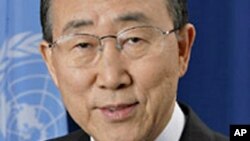The United Nations secretary-general has called on Guinea-Bissau's junta to hand over power to civilians immediately.
Speaking to the U.N. General Assembly on Wednesday, Secretary-General Ban Ki-moon said the world body seeks an "immediate return to constitutional order."
Mr. Ban also expressed concern about reports of human rights abuses by the military junta.
"Let me speak clearly: Those responsible for the coup and subsequent violations of human rights will be held accountable by the international community," said the U.N. chief.
Guinea Bissau's military seized power in mid-April and has refused to allow the return of ousted interim president Raimundo Pereira.
The issue stalled talks with the Economic Community of West African States. The regional bloc has imposed diplomatic and economic sanctions on the junta and has warned it will deploy troops to Guinea-Bissau if constitutional rule is not restored.
Mr. Ban said the U.N. is working closely with ECOWAS, the African Union and the Community of Portuguese-Speaking Countries (CPLP) to resolve the crisis.
The coup derailed a presidential run-off election to replace the late President Malam Bacai Sanha, who died in January.
Guinea-Bissau has endured numerous coups and attempted coups in the past 30 years. It is also a key transit point for international drug traffickers.
The United States has accused some senior military figures of being involved in the drug trade.
Government officials in Guinea-Bissau worry that the impact of economic sanctions will be limited because coup leaders will continue to fund their operations through drug sales.
Speaking to the U.N. General Assembly on Wednesday, Secretary-General Ban Ki-moon said the world body seeks an "immediate return to constitutional order."
Mr. Ban also expressed concern about reports of human rights abuses by the military junta.
"Let me speak clearly: Those responsible for the coup and subsequent violations of human rights will be held accountable by the international community," said the U.N. chief.
Guinea Bissau's military seized power in mid-April and has refused to allow the return of ousted interim president Raimundo Pereira.
The issue stalled talks with the Economic Community of West African States. The regional bloc has imposed diplomatic and economic sanctions on the junta and has warned it will deploy troops to Guinea-Bissau if constitutional rule is not restored.
Mr. Ban said the U.N. is working closely with ECOWAS, the African Union and the Community of Portuguese-Speaking Countries (CPLP) to resolve the crisis.
The coup derailed a presidential run-off election to replace the late President Malam Bacai Sanha, who died in January.
Guinea-Bissau has endured numerous coups and attempted coups in the past 30 years. It is also a key transit point for international drug traffickers.
The United States has accused some senior military figures of being involved in the drug trade.
Government officials in Guinea-Bissau worry that the impact of economic sanctions will be limited because coup leaders will continue to fund their operations through drug sales.











